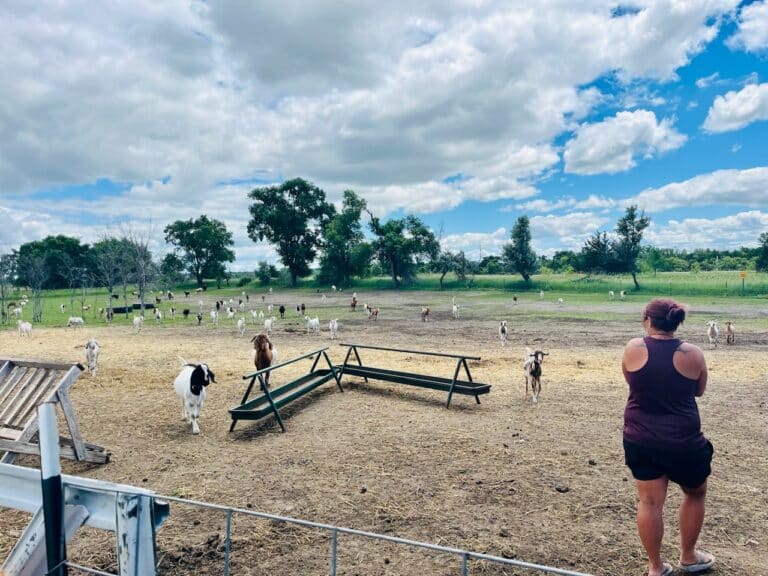A KCED Summer 2024 Newsletter Article:
Visiting Kandi Acres farm is an adventure. Looking around at pastures and lots, you see shepherd dogs, chickens, and goats. Her daughters help with chores while her eldest son checks in with his mother about product details as he updates the company website with full details and new pictures. Kandi Acres is a family affair, and their work ethic comes through in the mission of the work and advocacy, owner and operator Tiffany Farrier expresses.
Early this spring, Farrier joined other female farmers and ranchers and Susanne Hinrichs, University of Minnesota University (U of M) educator, at the Capitol to speak to legislators. They shared their stories and raised awareness of their issues and challenges. The invite came after Farrier, who is also an Elevate CBA graduate, attended the U of M’s Annie’s Project, an educational series of six workshops for farmers and ranchers about risk management of farming. Farrier’s ability to express her thoughts and confident personality shone through during this course. Hinrichs, who helps lead the class, identified that Farrier would be just the fit to carry her experiences to the Capitol. On March 25th, a collection of women appeared before senators to share these stories. “It was intimidating,” said Farrier of the experience, “I wasn’t prepared for all the lights. My voice was shaking.” But she stood up and shared her story, which includes being denied a business loan by seven different banks based on not having a higher education, not having a W2 after being a foster care provider for years prior, having no farming history, and likely the underlying identifier that brought the women together, the fact that she was a woman. “It wasn’t until 1988 that women could apply for a business loan without a man”, said Farrier, referring to the Women’s Business Ownership Act. This Act, which allowed women to apply for loans without the co-signature of men, was passed only in 1988 by President Reagan. It wasn’t until Farrier found female financial officer Shannon Nelson with Compeer Financial, a Farm Credit cooperative, that she secured funding for Kandi Acres.
All the hard work and challenges resulted in Minnesota’s first-ever Women in Ag Day, which Farrier proudly proclaimed alongside Governor Tim Walz. At the Kandi Acres farm, you can find various products, including Halal-certified goats, seasonal fresh asparagus, eggs, goat milk soaps, lotions, candles, and a variety of artisan breads, pickles, jams, sauces, and spices. This year, Farrier was awarded the Meat and Poultry Processing Grant, and the Mid-Minnesota Development Commission is guiding her in applying for the Business Builder Grant. With this funding, she will be able to build and operate a Halal processing plant for the goats she raises and will be open to processing for other local farms. “We already have a really good relationship with the Muslim community. We actually had several families out here for Eid uh-Adha to butcher animals for the traditional meal,” said Farrier. The Muslim holiday began on the evening of June 16th and continued until Thursday, June 20th. It is an important Muslim holiday and is celebrated with traditional meat and rice dishes.
“This processing center will be small, but it will serve the local Halal market.” Halal means ‘allowed’ or ‘lawful’ in Arabic and refers to how an animal is raised, slaughtered and processed. To be considered Halal, the animal will have been raised through a specific process and the animal experiences minimal suffering during processing. A prayer is said over the animal by a Muslim slaughter man who must face Mecca, Islam’s holiest city, in addition to other rituals. Most Halal-certified food is imported to the United States from countries like Australia and is frozen, not fresh.
In addition to offering a fresh, packaged Halal product, Kandi Acre’s production facility will include a shared commercial kitchen. Meeting state Department of Ag standards, shared commercial kitchens, otherwise known as incubators or community kitchens, can be used by businesses, such as food trucks, that must prepare food in a certified kitchen. This will be the only certified kitchen in Kandiyohi County and all of West Central Minnesota. She has also gained funding for a wind tunnel or a large-scale greenhouse for produce production. “Fresh produce is missing from our farmer’s markets,” said Farrier. “Kandi Acres is already certified in the Nutrition Program and is approved by the WIC and SNAP food assistance programs.” Regardless of economic security, this will make fresh produce available to everyone in Kandiyohi County.
The business model Farrier creates is a profitable farm and a community service, bringing fresh and clean products to residents and opening the door for other business owners. You can visit Farrier and Kandi Acres at the Farm to Market Farmer’s Market, hosted at the farm the first Sunday of every month through September from 11 a.m. until 3 p.m., and at numerous farmers markets throughout the region. Visit https://www.kandiacres.com to learn more about products and upcoming projects.
Picture includes those who advocated for Women in Ag Day at the capital. This includes: Amy Johnston, Extension Educator; Veronica Geisenhof, Country Sunshine farm, Brainerd; Susanne Hinrichs, Extension educator; Mary Kunesh, State Senator; Jodi DeJong-Hughes, Extension educator; Debbie Morrison, Sapsucker Farms, Mora, Tiffany Farrier, Kandi Acres, Hawick; and Emily Krekelberg, Extension educator.
*This article was originally published in the Summer 2024 KCED Newsletter*

